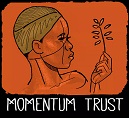BILLEDE
These days Momentum is going through a little growth spurt. Don’t worry we’re not experiencing growing pains, instead we have the pleasure of meeting new faces in the field, when we go out to talk to more farmers in our little corner of Kenya about the possibility of joining Momentum. Of course what I’m trying to say, is that we have officially started our third round of mobilization. For the Momentum team the word ‘mobilization’ describes a very specific process and no questions are asked when it is thrown around in our daily conversations. For you as readers, maybe it warrants a little explanation. In Momentum terms ‘mobilization’ is the process of getting new farmers to join us. We could call it a recruitment of new Momentum farmers. It entails a long list of activities, where the main purpose is to spread information about Momentum, the benefits of joining from a farmer perspective and equally importantly what Momentum expects from its farmers in return.
This week is the first week of a three-week mobilization in which the team is moving around Siaya County to meet farmers who are interested in knowing more about Momentum, and potentially interested in joining. The picture above is from the very first meeting of this mobilization. Each location the team goes to will be visited weekly the coming three weeks. The first week always has the lowest turn-up of people, but as those whose interest have been peeked tell their neighbors about Momentum, more will show up in the weeks to come.
Momentum is truly based in a society where information does not flow freely, and where knowledge is not necessarily shared. Very few can ask Google if they have questions. Even if your neighbor is part of something exciting that may be equally relevant for you, the chances of you getting enough information for your interest to be peeked are sometimes slim. So we use word-to-mouth methods, pass around flyers, and request that local farmers give us 2 hours of their time to hear what we have to offer them. And this is the third time Momentum is going through this process. As an organization working within agribusiness in a country predominantly relying on rain-fed agriculture Momentum moves with the seasons. With the two rain seasons in Kenya, Momentum has an opportunity to scale up twice a year. The farmers we are targeting now will receive their first Momentum farm inputs for the long rains 2015. Still, they become Momentum farmers long before they receive the inputs. The inputs are not worth much without the accompanying training, which the new farmers will start at the end of November.
The fact that this is the third time Momentum is scaling up means that it has now been more than a year since the first mobilization took place. For Christian, the founder of Momentum who is with us in Kenya these days, I’m sure this is an opportunity for reflection. You’ll notice him as the conspicuously white person on the picture above. The fact of the matter is that the past year Momentum and its team has been on a steep learning curve. Understanding how to make a business relationship work with local farmers, how to get them to work in groups, attend training and repay their loans, is complicated. By this third mobilization the team carries with it the lessons learned from the two previous ones. Between the first and the second mobilization some changes were made and more emphasis was put on the loan repayment. Already we are seeing the differences in groups’ willingness to repay. Between the second and third mobilization a major change is the stress now being put on group work. Momentum builds its business model on joint liability for loans, but also on joint liability for ensuring that each farm is planted and weeded correctly – which means working in groups. Hopefully the roughly 130 farmers we are adding to our family will be better mentally prepared to embrace group work.
This goes to show that as small young organization aiming for maximum impact Momentum is also partaking in a learning process. But we have our eyes on the goal, and just to show you what that goal looks like I’m including a picture of a non-Momentum farm versus a Momentum farm. They were both planted at the same time, but we suspect that one of these two farmers will have a significantly better yield…
BILLEDE

Recent Comments